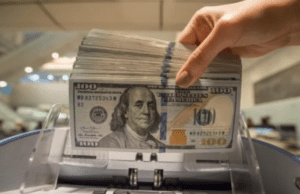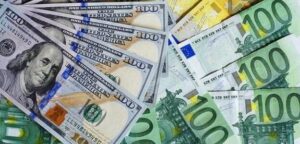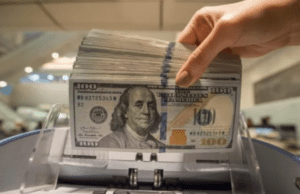
The US dollar strengthens against the euro, yen and pound sterling in trading on Monday.
The market is waiting for the meeting of the Federal Reserve System (Fed), which will be held on November 1-2. Traders are confident that the US Central Bank will raise the base interest rate by 75 basis points (bp) following the results of the fourth meeting in a row. As a result, the rate will reach the level of 3.75-4% – the maximum since December 2007.
Traders will be closely watching Fed Chairman Jerome Powell’s statements to see if the US central bank intends to slow down the pace of policy tightening from December, writes the Financial Times newspaper. The global economy is weakening, and experts are already seeing signs that the peak of inflation in the United States has passed. In this regard, investors are increasingly expressing fears that the Fed may overdo it with raising rates and provoke an excessive recession in the economy.
The ICE-calculated index, which shows the dynamics of the dollar against six currencies (the euro, the Swiss franc, the yen, the Canadian dollar, the pound sterling and the Swedish krona), adds 0.08% on Monday, the broader WSJ Dollar – 0.19%.
The euro/dollar pair is trading at $0.9946 as of 8:55 am KSK, compared to $0.9966 at market close on Friday.
The US dollar against the yen rose to 147.92 yen against 147.48 yen in the previous session.
The pound dropped to $1.1592 from $1.1617 on Friday.
The Bank of England is also holding a meeting this week, its results will be made public on 3 November. Experts expect the British Central Bank to raise the base rate by 75 bp. – until 3%. The Bank of England did not raise the rate by more than 50 bp. since 1989, notes FT.
The dollar against the yuan edged up to 7.2698 yuan from 7.2525 yuan at market close on Friday amid weak economic data from China.
The Purchasing Managers’ Index (PMI) for China’s manufacturing industry fell to its lowest level since July of 49.2 in October from 50.1 a month earlier, according to data from the National Bureau of Statistics of the People’s Republic of China (GSO). An index value below 50 points indicates a decline in activity in the sector.
PMI services in China in October fell to 48.7 points, dropping below 50 points for the first time since May.

The dollar exchange rate on Thursday morning changes slightly against the euro and the pound, while the US currency is sharply declining against the yen.
The euro/dollar pair is trading at $1.0076 by 8:57 sq.m. against $1.0086 at the close of the session on Wednesday, the euro is losing about 0.1%.
The pound is trading at $1.1625 compared to $1.1628 at the close of the previous session.
The dollar fell 0.8% against the yen to 145.27 yen compared to 146.39 yen the day before. Earlier this month, the yen fell to its lowest level since 1990.
The ICE-calculated index, which shows the performance of the US dollar against six currencies (the euro, the Swiss franc, the yen, the Canadian dollar, the pound sterling and the Swedish krona), is down about 0.1%. Over the past two sessions, the indicator fell by 2% and dropped to a month low.
The main reason for the fall of the dollar this week was the expectation that the Federal Reserve may slow down the pace of raising the key rate as inflation eases and problems in the US economy, writes Trading Economics.
Analysts, on average, expect the Fed to raise rates by 75 basis points in November and expect a 50 bp hike in December.
Also, market participants are waiting for the results of the meetings of the European Central Bank and the Bank of Japan, which will end this week.
The ECB is expected to raise key interest rates again on Thursday by 75 bp. The European Central Bank is constrained from refusing to raise interest rates in the near term as consumer price growth in the euro area is likely to have not peaked yet, BlueBay Asset Management chief investment officer Mark Dowding said in an interview with Dow Jones.
Meanwhile, the Bank of Japan on Friday, most likely, will not change the main parameters of its monetary policy.

The US dollar is weakly strengthening against the euro at auction on Monday, depreciating against the pound sterling.
The yen against the dollar, which jumped at the beginning of the session, again moved to the decline.
The ICE-calculated index showing the dynamics of the dollar against six currencies (the euro, the Swiss franc, the yen, the Canadian dollar, the pound sterling and the Swedish krona) adds less than 0.1%, the broader WSJ Dollar Index – 0.25%.
The euro/dollar pair is trading at $0.9855 as of 9:15 p.m. compared to $0.9864 at the market close on Friday
The pound sterling has risen in price by this time to $1.1375 in comparison with $1.1304 following the results of the previous auctions. The pound strengthens after the refusal of former British Prime Minister Boris Johnson to fight for the post of leader of the Conservative Party and, accordingly, the head of the British government.
This gives ex-Finance Minister Rishi Sunak a good chance of winning, the Financial Times notes.
The dollar/yen pair was trading at 148.93 yen as of 9:15 a.m. versus 147.68 yen at market close on Friday. At the beginning of the session, the dollar fell to 145.53 yen, but then again turned to growth.
On Friday, the US currency fell 0.72% against the yen, which the Nikkei newspaper attributed to the intervention of the Japanese authorities in the foreign exchange market.
Japan’s Finance Minister Shun’ichi Suzuki said on Monday that the Japanese government would take the necessary measures to prevent “excessive exchange rate fluctuations.”
He declined to say whether there were interventions on Friday and Monday.
The dollar against the yen on Friday rose to 151.94 yen – the highest since July 1990.
The dollar against the yuan edged up to 7.2535 yuan from 7.2438 yuan despite stronger than expected Chinese GDP data.
China’s GDP in the third quarter increased by 3.9% in annual terms after rising by 0.4% in April-June. The consensus forecast of experts polled by Trading Economics called for growth of 3.4%.

The US dollar is steadily strengthening against the euro and the pound sterling, having updated a 32-year high against the yen at the auction on Friday.
Experts no longer rule out that the Federal Reserve System (Fed) will bring the base interest rate to 5%, said Francesco Pesole, an analyst for the foreign exchange market at ING. The two-year US Treasury yield topped 4.6% on Friday.
“The outlook for a Fed rate hike continues to cast doubt on the possibility of a sustained rally in US stocks, and the chances that demand for the dollar as a safe haven asset will rise are quite high,” Dow Jones quoted Pesole as saying.
The ICE-calculated index, which shows the dynamics of the dollar against six currencies (the euro, the Swiss franc, the yen, the Canadian dollar, the pound sterling and the Swedish krona), adds 0.56%, the broader WSJ Dollar Index – 0.65%.
The euro/dollar pair is trading at $0.9748 as of 3:00 pm compared to $0.9788 at the market close on Thursday.
The pound sterling has fallen in price by this time to $1.1113 against $1.1239 the day before.
The pressure on the pound is exerted by both political uncertainty in the UK and signals of the continued deterioration of the situation in the country’s economy.
On the eve of Liz Truss announced her resignation as leader of the Conservative Party, which entails her resignation from the post of prime minister, where she worked for only 45 days.
Meanwhile, retail sales in the UK in September fell by 1.4% compared to the previous month, while experts on average expected them to decline by 0.5%. Retail sales last month were 1.3% lower than pre-pandemic February 2020.
The dollar against the yen is 151.54 yen against 150.15 yen at the close of the previous session. On Friday, Japanese Finance Minister Shun’ichi Suzuki again expressed concern about the sharp weakening of the yen and expressed his readiness to intervene to support the national currency.
On Friday, the Bank of Japan continued unscheduled purchases of government bonds for the second day in a row to contain the growth in the yield of ten-year bonds, which rose above the upper limit of the CBR’s target range of 0.25% per annum.
The dollar/yuan pair is trading at 7.2463 yuan/$1, compared to 7.2164 yuan/$1 at the close of the previous session. The yuan is trading near a 14-year low against the US currency during the 20th Congress of the Communist Party of China, which will end on Saturday.

The value of the US currency against the yen jumped to a maximum since August 1990 after the Japanese Central Bank announced an unscheduled redemption of government bonds. This decision was made following the jump in the yield of 10-year Japanese government bonds above the upper limit of the Central Bank’s target range of 0.25% per annum.
The dollar against the yen soared to 149.98 yen compared to 149.9 yen at the close of the previous session.
The Bank of Japan maintains an ultra-loose monetary policy, thus seeking to support the country’s economic recovery from the effects of the COVID-19 pandemic. His policy is seriously at odds with the actions of other world central banks, raising rates to curb inflation, notes Trading Economics. This continues to put pressure on the yen and requires the Japanese Central Bank to adjust the policy of controlling the yield curve of government bonds.
The ICE-calculated index, which shows the dynamics of the dollar against six currencies (the euro, the Swiss franc, the yen, the Canadian dollar, the pound sterling and the Swedish krona), lost 0.14% on Thursday, the broader WSJ Dollar Index lost 0.05%.
The euro/dollar pair is trading at $0.9792 as of 9:15 Moscow time, compared to $0.9775 at the close of the market on Wednesday.
The pound sterling fell by this time to $1.1221 against $1.1218 the day before.
The dollar remains strong and any downward adjustments will be short-lived as long as the Federal Reserve (Fed) continues to raise the base rate, said ING analyst Francesco Pesole, quoted by Dow Jones.
The Fed’s Beige Book regional survey published on Wednesday showed that forecasts for the US economy have become more pessimistic amid growing concerns about weakening demand.
Economic activity in the country at the beginning of autumn generally slightly increased, but the situation was different in different industries and regions. Four of the twelve Federal Reserve Banks (FRB) said that activity in their districts did not change, and two reported a decrease. Negative factors were higher interest rates and inflation, as well as disruptions in supply chains.

The US dollar is getting cheaper against the euro and the pound sterling at the auctions on Monday, it is stable against the yen.
The ICE-calculated index, which shows the dynamics of the dollar against six currencies (the euro, the Swiss franc, the yen, the Canadian dollar, the pound sterling and the Swedish krona), is losing 0.29%, the broader WSJ Dollar Index – 0.27%.
The euro/dollar is trading at $0.9750 compared to $0.9722 at the market close on Friday.
The rate of the American currency against the yen is 148.72 yen against 148.75 yen following the results of the previous session.
The pound rose to $1.1272 from $1.1183. On Friday, British Prime Minister Liz Truss fired Chancellor of the Exchequer Quasi Kwarteng, appointing Jeremy Hunt to the post.
According to the Financial Times, several British Conservative MPs and prominent figures from the City of London are calling for Truss herself to step down as prime minister after controversial economic decisions that undermined her credibility.
Britain’s new finance minister told the BBC last Sunday, speaking of the possibility of winding down any of the government’s recent stimulus measures, that “nothing is out of the question.”
Later on Monday, Hunt intends to make a statement regarding the country’s medium-term budget.
The dollar rose against the yuan during trading to 7.1996 yuan from 7.1910 yuan at market close on Friday. Chinese President Xi Jinping, speaking at the 20th Congress of the Chinese Communist Party (CCP), which opened on Sunday, signaled that the country’s authorities would continue their tough policy to contain the spread of COVID-19, which has already seriously weakened the country’s economy this year.